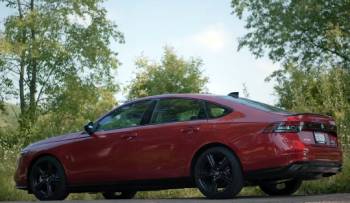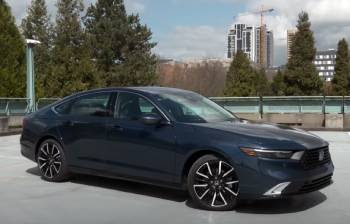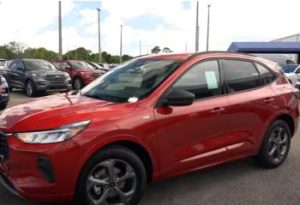So, you’re in the market for a sleek new Honda Accord? Well, first, let’s just say, excellent choice! The Honda Accord has always been a favorite for drivers worldwide, striking the perfect balance between luxury, reliability, and performance.
But then comes the not-so-simple decision: do you go with the regular Honda Accord or try out the Honda Accord Hybrid? Let’s dive into the nitty-gritty of each, giving you the tools to make an informed decision.
A Brief Comparison Table
| Feature/Aspect | Honda Accord | Honda Accord Hybrid |
| Engine Options | 1.5-liter turbo-four (192hp) 2.0-liter turbo-four (252hp) | 2.0-liter four-cylinder + electric motor (212hp total) |
| Transmission | CVT | E-CVT (Electronic Continuously Variable Transmission) |
| Fuel Efficiency (City/Highway) | Approx. 30/38 MPG | Approx. 48/48 MPG |
| Emissions | Higher | Lower |
| Initial Cost | Generally lower | Generally higher |
| Maintenance | Standard | Potentially specialized |
| Resale Value | Standard depreciation | Better retention |
| Driving Experience | Sportier feel, combustion engine noise | Quieter, smoother with electric motor |
Honda Accord: The Good Old Faithful

The classic Honda Accord has been around for a while, and it’s not just because of its pretty face.
Pros:
- Performance:
Known for its robust engine options and sporty performance, the regular Honda Accord gives you that kick when you press down the pedal.
- Cost:
Typically, the standard Honda Accord comes in at a lower upfront cost compared to its hybrid counterpart.
- Reliability:
Honda has built its reputation on producing long-lasting cars, and the Accord is no exception.
Cons:
- Fuel Efficiency:
While not exactly a gas-guzzler, the traditional Honda Accord can’t compare to the fuel efficiency of its hybrid counterpart.
- Eco-Friendliness:
If reducing your carbon footprint is a priority, this model falls short compared to the hybrid.
Also Read: Is AAA Tire And Wheel Insurance Worth It?
Honda Accord Hybrid: The New Age Marvel

The Honda Accord Hybrid takes everything we love about the classic Accord and kicks it up a notch with hybrid technology.
Pros:
- Fuel Efficiency:
You’ll be visiting gas stations less often with the Accord Hybrid’s impressive MPG.
- Eco-Friendly:
With reduced emissions, you’re doing Mother Earth a solid.
- Resale Value:
Generally, hybrid cars tend to retain their value for longer, which might come in handy if you ever decide to trade it in or sell.
Cons:
- Upfront Cost:
Typically, you’ll shell out a bit more upfront for the hybrid model.
- Maintenance:
While the Honda Accord Hybrid is reliable, hybrid technology might require specialized (sometimes pricier) maintenance.
Key Differences Between Honda Accord and Honda Accord Hybrid
When you’re perusing the market, there’s a barrage of options, especially with the evolving hybrid technology. If you’re already leaning towards Honda Accord, the next logical question is: traditional or hybrid?
Both have their unique selling points, and understanding these key differences is essential to making the best decision for your needs.
- Powertrain and Performance
Honda Accord:
Traditionally, the Honda Accord has boasted a strong engine line-up, including a turbocharged 1.5-liter four-cylinder with about 192 horsepower and a 2.0-liter turbo-four with 252 horsepower. It offers a CVT (Continuously Variable Transmission) for smoother shifts and a more engaging driving experience.
Honda Accord Hybrid:
This variant uses a 2.0-liter four-cylinder engine combined with an electric motor, producing a total system output of 212 horsepower. While the numbers might seem lower, the instant torque from the electric motor often makes it feel zippier, especially at city speeds.
- Fuel Efficiency
Honda Accord:
While the Accord is efficient for a non-hybrid car, averaging around 30 MPG for city driving and 38 MPG for highway, it can’t compete with its hybrid sibling in this arena.
Honda Accord Hybrid:
Hybrids are designed for efficiency. You can expect around 48 MPG for both city and highway drives, a significant jump from the non-hybrid version. This means more savings in the long run.
- Emissions and Environment
Honda Accord:
As a gasoline-powered car, it does produce higher emissions than a hybrid.
Honda Accord Hybrid:
With its eco-friendly drive system, the Accord Hybrid emits fewer greenhouse gases, making it a more environmentally conscious choice.
- Cost of Ownership
Honda Accord:
Generally, the starting price is lower than the hybrid variant. However, considering the fuel efficiency, you might end up spending more on gas over time.
Honda Accord Hybrid:
While you might shell out more initially, the reduced fuel costs over time could make it more cost-effective in the long run. Furthermore, many regions offer tax incentives for hybrid or electric vehicle purchases, which can further offset the cost.
- Maintenance
Honda Accord:
Traditional cars, having been around longer, have a well-established maintenance routine. Parts are abundant and mechanics are familiar with the systems.
Honda Accord Hybrid:
The hybrid system introduces added complexity. While they generally require less maintenance since they rely more on their electric motor at times, when they do need repairs, it might be costlier due to the specialized nature of hybrid systems.
- Resale Value
Honda Accord:
Traditional cars, including the Accord, tend to depreciate at a standard rate.
Honda Accord Hybrid:
As the trend shifts towards eco-friendly vehicles, hybrids, including the Accord Hybrid, tend to hold their value a tad better in the resale market.
- Driving Experience
Honda Accord:
Known for its sporty feel, the Honda Accord’s traditional engine gives that internal combustion growl many car enthusiasts love.
Honda Accord Hybrid:
With the electric motor’s instant torque and a more silent operation, driving is quieter and smoother, especially at lower speeds.
Also Read: Key Differences Between F-350 And. F-450 Insurance.
Frequently Asked Questions (FAQs)
Both cars are leaders in the hybrid category, and the choice often boils down to brand preference. The Accord Hybrid shines in interior quality and a slightly smoother ride. In contrast, the Camry Hybrid boasts its legendary reliability and slightly better fuel efficiency.
“Better” is subjective. Honda Accords tend to have a sportier feel and more upscale interiors, while Toyota Camry is lauded for its long-lasting reliability. It’s like choosing between chocolate and vanilla – both are delightful in their own way!
If you’re looking at the hybrid specifically, the Honda Accord Hybrid offers more space, power, and features, while the Toyota Corolla Hybrid might be easier on the wallet with its lower price tag and slightly higher fuel efficiency.
Absolutely, if you value fuel efficiency, a smoother ride, and eco-friendliness. But if upfront cost is a significant factor for you, weigh the long-term fuel savings against the initial price difference.
The main downside would be the higher initial cost and potential specialized maintenance down the road.
While it’s a solid vehicle, the Toyota Camry Hybrid may not offer as engaging a drive as some competitors, and some find its infotainment system less intuitive.
Conclusion
In conclusion, while both the Honda Accord and Honda Accord Hybrid offer commendable features, your decision will likely depend on your specific needs, budget, and long-term plans. If you prioritize immediate savings and love that traditional car feel, the Honda Accord might be your pick. But if you’re looking for long-term efficiency, environmental consciousness, and potential resale value, the Honda Accord Hybrid holds the edge.
Both the Honda Accord and the Honda Accord Hybrid are stellar choices. It boils down to what you prioritize: immediate cost savings and a sportier feel with the classic Accord or long-term fuel efficiency and eco-friendliness with the Hybrid. Either way, you’re driving off in style!




